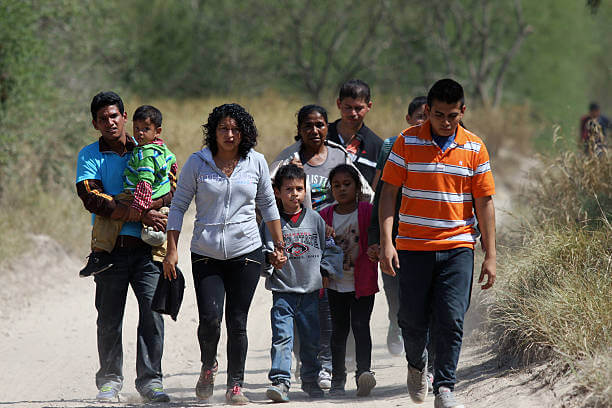As we have seen above, the end of Title 42 USA is imminent this May 11. The controversial anti-immigration measure sanctioned during the Trump administration under the pretext of guarding the borders due to the COVID pandemic will come to an end, but what about the rest of the anti-immigration measures installed during the Trump administration?
Title 42 ends, it is true, but other measures that impose restrictions on asylum and toughen anti-immigration measures at the borders could be implemented. And among these is the MPP program, also known as the “Migrant Protection Protocol” or “Stay in Mexico”.
Now, what exactly is MPP? How does it affect migrants trying to enter the United States? In today’s article, our experienced lawyers at Jaskot Law will answer all these questions.
Remember that if you are going through difficulties in your immigration process, at Jaskot Law we can help you. We have a group of experienced attorneys who can help you, whether you are seeking asylum in the United States or need assistance in obtaining a visa. Contact us at +1 (410) 235-6868 or via [email protected].
What is MPP?
Also known as the “Migrant Protection Protocol” or “Stay in Mexico,” the MPP program is a policy implemented by the U.S. government in 2019 that. forces asylum seekers to wait in Mexico while their cases are processed in the country’s immigration courts..

This policy has been criticized by multiple migrant rights groups and asylum advocates, as they argue that it violates U.S. asylum laws, in addition to exposing immigrants to the violence and dangers they face in their home countries. In addition, while the Department of Homeland Security (DHS) announced in 2021 the suspension of new enrollments in the MPP program (which had Supreme Court approval), it was reactivated in October 2022.
Can immigrants under the MPP program enter the United States?
No, not all migrants who were in the MPP program are currently allowed to enter the United States. As of February 19, 2021, the Biden administration announced that it would begin reviewing the cases of MPP migrants who still have active cases in U.S. immigration courts and who had been returned to Mexico under the previous administration’s policies.
These migrants would be allowed to enter the United States to continue their asylum process. However, this measure has been implemented gradually and many migrants are waiting in Mexico to be processed.

For this reason, it is extremely important to consult with an immigration lawyer who knows how to advise you properly and takes into account the particularities of your case.
At Jaskot Law We have a group of experienced attorneys who can help you with your asylum application process in the United States. Contact us at +1 (410) 235-6868 or via [email protected].
Can I enter the U.S. now if I was on MPP but returned to my home country?
No, you still cannot enter the country if you were in the MPP program, even if you returned to your home country at the time. Only people with an active case are eligible for parole in the United States through the MPP reduction program. However, those who received a deportation order while in the MPP program may be eligible for a program in the future.
In addition, some individuals in this situation may file appeals to reopen their case before the immigration courts and request that their deportation orders be set aside and, depending on the particulars of each individual case, it may be necessary to file the appeal within 90 or 180 days after receipt of the deportation order.

Therefore, you should consider that this is a complex process that requires the assistance of a professional immigration attorney who can help you with the particularities of your case.
At Jaskot Law we can defend you against a deportation order. Contact us at +1 (410) 235-6868 or via [email protected].
Who is exempt from the MPP program?
As communicated by the U.S. government in December 2021, the persons exempted from the MPP program are:
- Unaccompanied migrant children.
- Migrants with an advance parole document or on parole status.
- Migrants with criminal records.
- Migrants of law enforcement interest to the U.S. or Mexican governments.
In addition, the following individuals are presumed to be exempt from prosecution under the MPP program because of their particular vulnerabilities:
- Migrants with health problems (both physical and psychological), including a disability or pregnancy-related medical condition.
- Migrants with particular vulnerabilities given their advanced age.
- Refugee migrants who are at risk in their country of origin because of their sexual orientation or gender identity.
If you would like to find out if you are exempt from the MPP program, in Jaskot Law we can help you. Contact us at +1 (410) 235-6868 or [email protected].
Conclusion
The end of Title 42 USA this May 11 is great news for thousands of migrants who were harmed by the measure sanctioned by the Trump administration. However, this should not hide the fact that other anti-immigration measures will remain in place and it should not be lost sight of that they could be a difficult obstacle for thousands of migrants to overcome.
Among the measures that will continue to restrict asylum and toughen anti-immigration measures at the borders, we can highlight the MPP program, also known as the “Migrant Protection Protocol” or “Stay in Mexico”, which forces asylum seekers to wait in Mexico while their case is processed in the country’s immigration courts.
While this this measure has had its ups and downs in the courts, it is currently valid, and it is worth noting that many immigrants who fell under the MPP program still face difficulties.
Remember that if you are going through difficulties in your immigration process, at Jaskot Law we can help you. Contact us at +1 (410) 235-6868 or via [email protected].
Sources
Department of Homeland Security (DHS) – Reimplementation of the MPP Program
Frequently Asked Questions
What is MPP Program?
The MPP is a program implemented by the U.S. government in 2019 that forces asylum seekers to wait in Mexico while their case is processed in the country’s immigration courts.
Can immigrants under the MPP program enter the United States?
Currently, not all migrants who were in the MPP program are allowed to enter the United States. As of February 19, 2021, the Biden administration announced that it would begin reviewing the cases of MPP migrants who still have active cases in U.S. immigration courts and who had been returned to Mexico under the previous administration’s policies. These migrants would be allowed to enter the United States to continue their asylum process. However, this measure has been implemented gradually and many migrants are waiting in Mexico to be processed.
Can I enter the U.S. now if I was on MPP but returned to my home country?
No, you still cannot enter the country if you were in the MPP program, even if you returned to your home country at the time. Only individuals with an active case are eligible for parole in the United States through the MPP reduction program. However, those who received a deportation order while in the MPP program may be eligible for a program in the future.
What anti-immigration measures remain in place after the end of Title 42?
Although Title 42 is coming to an end, other measures that impose restrictions on asylum and toughen anti-immigration measures at the borders could be implemented, including the MPP program.
What should I do if I need help with my immigration process?
If you need help with your immigration process, it is important to consult with an immigration attorney who can advise you properly and take into account the particularities of your case. At Jaskot Law, we have a group of experienced attorneys who can help you, whether you are seeking asylum in the United States or need assistance in obtaining a visa. You can reach us at +1 (410) 235-6868 or via [email protected].
Juan Berkowsky is a professional writer specialized in communications for social networks and digital media. His mission is to empower people through knowledge and access to information. He work with honesty and dedication to assist all those seeking to navigate the sometimes tough U.S. immigration process.


